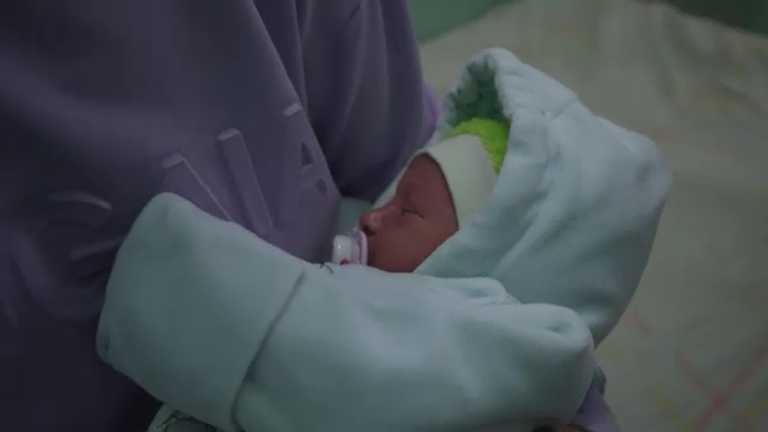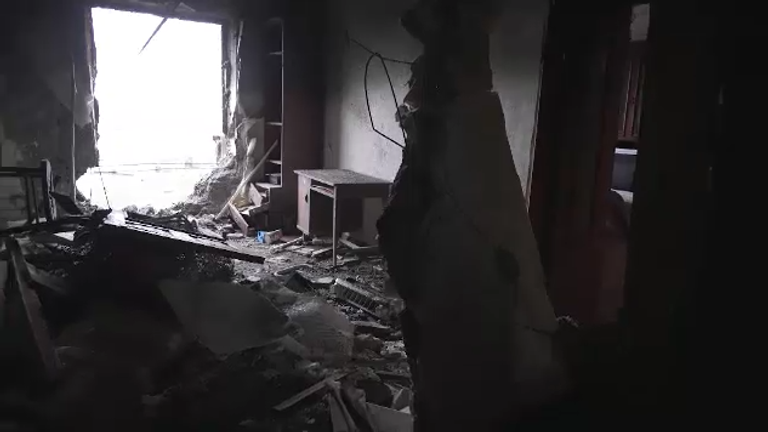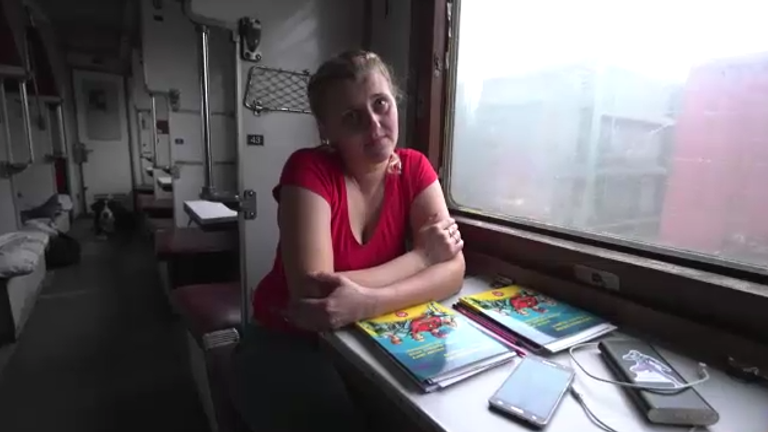
The mother wept with relief as she cradled her newborn baby at the only maternity hospital still working in the Ukrainian city of Kherson.
Yulia Khomchyk, 37, discovered she was pregnant after Russian forces had seized the regional capital during the first days of the full-scale invasion in February.
But almost nine months later, a major Ukrainian counter-offensive managed to liberate the city in one of the most significant victories of the war so far – and just in time for the birth.
Putin scraps major annual news conference – Ukraine war latest
“She is clearly Ukrainian, clearly born without all this occupation,” Yulia said, nursing her tiny girl called Maldina as she sat on a hospital bed next to a radiator to keep them warm.
“I am so glad that she is clearly Ukrainian. I am so glad, so glad.”
Kherson’s renewed freedom has brought a new reality, though, as Russian troops switch from being occupiers to attackers, launching deadly rocket and mortar strikes daily.
The bombardments have left more than 40 civilians, including at least one child, dead and many more injured. At least three people were killed on Monday in the latest barrage.
Adding to the misery, the city is suffering from power outages, a lack of running water and many residents are reliant upon food handouts to survive.
It is a huge challenge for Halyna Luhova, the de-facto mayor, but she said the city would endure.
“The situation is pretty difficult,” she told Sky News in an interview on Saturday.
“They shell us daily… innocent civilians die… but even if we will be hungry, freezing, without electricity – we will be without Russians.”
The mayor – known as the head of the Kherson city military administration – took Sky News to visit a number of aid points where basic food supplies and water are being given to people.
The majority of those queuing up for support looked to be pensioners but there was the odd family with young children.
Dmytro Hubarev, 44, said life was hard as he received a loaf of bread, a can of beans and a tin of ham. “We were waiting for heat and power,” he said. “Now we are under shelling.”
Some residents approached the mayor with particular problems, including one woman who complained that she had pain in one of her eyes.
The mayor assured her: “We will be giving people a bag with necessary medicine. You will be receiving humanitarian aid with this bag with all the necessary [supplies].”
The woman, Natalia Skyba, 53, did not seem satisfied.
Read more:
After setbacks, Putin appears intent on breaking Ukraine’s resistance in a less conventional way
How ‘four-legged rehabilitators’ are helping Ukrainian children traumatised by war
Asked by Sky News if she thought life was better or worse now Russia’s occupation had ended, she replied: “Worse. Worse. They are giving us aid but not for everyone.”
Yet life in this city while it was under Russian control was a different kind of hell.
People, who opposed the occupation, lived under fear of arrest, torture and even death if they stepped out of line or attempted to defy Kremlin plans to make Kherson part of Russia.
It is not an existence most want to return – though deciding which is the worst of two evils is becoming harder as the Russian shelling intensifies.
Leonid Borovskyi, 60, surveyed a huge hold in the wall of his next-door neighbour’s flat on the seventh floor of an apartment block in a residential area in the city.
It was caused by a Russian rocket that slammed into the building the previous week.
Asked whether enduring Russian attacks was a price worth paying for liberation, he paused and thought deeply before answering.
“From the one side – yes. From the other side – no,” he said.
“Freedom comes at a high price.”
More than 200,000 residents have left the city since Russia’s occupation began – most before the liberation – leaving just under 80,000 still in their homes.
Because of the danger of incoming rounds, the Ukrainian government is encouraging more people to leave until it is safer.
An evacuation train departs each afternoon with new faces on board.
Sat at a window seat with a table, Viktoria Tupikonenko, 34, described how her whole family had celebrated the liberation of Kherson.
She said she could not believe one month later she would be forced to flee with her five-year-old son and 13-year-old daughter. Her husband stayed behind with his parents.
“I can’t believe I am just leaving everything – my native land, my native home,” Viktoria said, tears streaking down her face.
“I am leaving my husband but I must go. We don’t know for how long and I don’t know if I will come back, or if our house will survive, or if I even see my husband again.”
But she is in no doubt that this pain is a price worth paying for her country to be free.
“Freedom yes! We need to hold on.”









